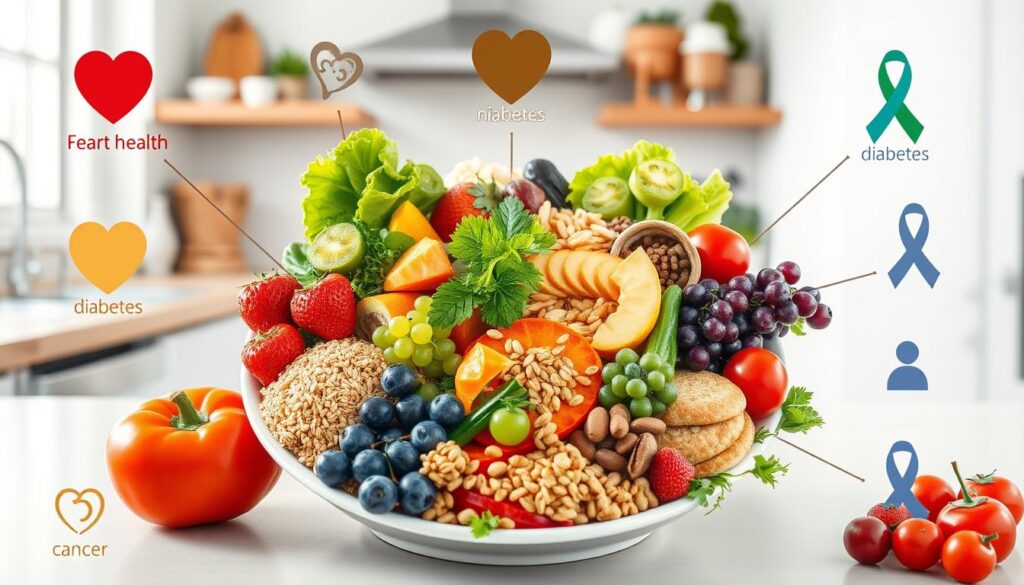Proper nutrition is key to stopping chronic diseases before they start. Eating a balanced diet full of fruits, veggies, whole grains, lean proteins, and healthy fats helps a lot. This can lower the risk of heart disease, type 2 diabetes, and some cancers.
Registered dietitians and nutrition experts help by using nutrition to prevent diseases. They work at all levels, from helping individuals to making big changes in communities and policies. Their work greatly improves public and personal health.
Key Takeaways
- Proper nutrition plays a crucial role in preventing the development of chronic diseases.
- Consuming a balanced diet rich in essential nutrients can reduce the risk of chronic conditions like heart disease, type 2 diabetes, and cancer.
- Nutrition-focused preventive strategies can positively impact public health and individual health outcomes.
- Registered dietitians and nutrition professionals play a key role in implementing these strategies.
- Adopting a healthy, nutrient-dense diet is a proactive approach to disease prevention.
What Are Chronic Diseases and Their Global Burden?
Chronic diseases like cardiovascular diseases, type 2 diabetes, and cancer are big threats to health worldwide. They are the top causes of death and disability globally. These diseases also lead to a lot of sickness, death, and cost to the economy.
Chronic diseases greatly affect our quality of life and how much healthcare we use. They also hurt the well-being of our society.
Impact of Chronic Diseases on Public Health
The burden of chronic diseases is huge. They cause more than 70% of all deaths globally. They hit low- and middle-income countries the hardest.
The cost is also huge. Chronic diseases cost trillions of dollars in healthcare and lost work each year.
Leading Causes of Chronic Diseases
- Unhealthy dietary habits, including too much of processed foods, sugary drinks, and fats
- Physical inactivity and sitting too much
- Tobacco use and breathing in secondhand smoke
- Drinking too much alcohol
We need to tackle these risk factors with strong public health actions and policies. This is key to reducing the burden of chronic diseases and better health for all.
“Chronic diseases are the greatest threat to global health and development in the 21st century, responsible for over 70% of all deaths worldwide.”
The Significance of Nutrition in Chronic Disease Prevention

Nutrition is key in stopping chronic diseases. Nutrition-focused prevention helps lower disease rates. Eating well helps prevent chronic diseases, which is the best way to improve health.
Many studies show nutrition is powerful in preventing chronic diseases. Eating lots of fruits, veggies, whole grains, and lean proteins lowers disease risk. On the other hand, eating too much processed food and unhealthy fats raises disease risk.
Adding dietary interventions to public health plans can greatly reduce disease burden. Teaching people about nutrition-focused prevention helps them protect their health. This empowers them to make healthy choices for their future.
The role of nutrition in preventing chronic diseases is huge. By choosing healthy foods and using nutrition-focused prevention strategies, we can create a healthier future. This will lessen the impact of chronic diseases on our communities.
The Role of Nutrition in Preventing Specific Diseases
Nutrition is key in fighting off many chronic diseases. By choosing the right foods, people can lower their risk of heart disease, type 2 diabetes, and some cancers.
Cardiovascular Diseases
Eating less saturated fat and sodium, and more fruits, veggies, whole grains, and healthy fats helps prevent heart disease and stroke. These foods can lower blood pressure and improve cholesterol levels. They also help prevent artery plaque buildup.
Type 2 Diabetes
A diet low in added sugars and refined carbs, and high in fiber, can prevent type 2 diabetes. Staying at a healthy weight and exercising regularly also helps.
Cancer
Eating foods rich in antioxidants, like fruits and veggies, can lower cancer risk. Also, eating less processed and red meat, and avoiding harmful substances, helps prevent cancer.
By adopting these nutrition tips, people can fight chronic diseases and boost their health and happiness.
“The food you eat can be either the safest and most powerful form of medicine or the slowest form of poison.” – Ann Wigmore
Nutrition Guidelines for Disease Prevention

Eating well is key to avoiding chronic diseases. The Dietary Guidelines for Americans offer solid advice. They help people avoid many health problems.
Dietary Recommendations from Authoritative Sources
The Dietary Guidelines for Americans are from the USDA and HHS. They stress the need for a balanced diet. They suggest eating lots of fruits, vegetables, whole grains, lean proteins, and healthy fats.
They also say to cut down on added sugars, sodium, and saturated fats. These foods can lead to serious health issues.
The American Heart Association and American Diabetes Association have their own rules. They focus on stopping cardiovascular diseases and type 2 diabetes. Their advice matches the Dietary Guidelines for Americans, showing the value of a complete approach to disease prevention through nutrition.
- Emphasize a variety of fruits, vegetables, whole grains, lean proteins, and healthy fats
- Limit the intake of added sugars, sodium, and saturated fats
- Follow guidelines from authoritative sources, such as the Dietary Guidelines for Americans, the American Heart Association, and the American Diabetes Association
“A balanced diet rich in nutrient-dense foods is essential for maintaining overall health and reducing the risk of chronic diseases.”
Following these nutrition guidelines helps prevent chronic diseases. It also boosts overall health and well-being.
The Importance of Nutrition Counseling

Nutrition counseling is key in preventing diseases. It helps people develop good eating habits and make smart diet choices. Registered dietitians and nutrition experts work with clients. They give personalized advice, teach about food, and support lasting lifestyle changes.
Through nutrition counseling, people learn to eat foods that prevent diseases. They understand how nutrition affects health. This approach helps avoid chronic conditions and promotes healthy habits and dietary education.
Nutrition counseling sessions include:
- Checking the client’s diet and health goals
- Creating a nutrition plan that fits the client’s needs
- Help with meal planning, shopping, and cooking
- Support to keep up with lifestyle changes
Working with a nutrition expert helps people navigate disease prevention. They learn to adopt lasting healthy habits for better health.
| Benefits of Nutrition Counseling | Impact on Disease Prevention |
|---|---|
| Personalized dietary guidance | Reduced risk of chronic conditions |
| Enhanced dietary education | Improved overall health and well-being |
| Sustainable lifestyle changes | Preventive measures against disease |
“Nutrition counseling empowers individuals to take control of their health through informed dietary choices and sustainable lifestyle changes.”
The Link Between Nutrition and Gut Microbiome
Research shows a key link between what we eat and our gut microbiome. The gut microbiome is a group of tiny organisms in our digestive system. What we eat can change the types and numbers of these microbes, affecting our health.
Impact of Diet on Gut Microbiome Diversity
Eating a balanced diet is important for a healthy gut microbiome. Foods like fiber, whole grains, fruits, and veggies help keep the gut diverse and full of good bacteria. On the other hand, eating too much processed food, saturated fats, and sugar can harm the gut microbiome.
Role of Gut Microbiome in Metabolic Disorders
The gut microbiome is key in many bodily functions, like energy use and nutrient absorption. A lack of diversity in the gut microbiome can lead to diseases like type 2 diabetes and obesity. Eating well can help keep the gut microbiome healthy, reducing the risk of these diseases.
Eating foods that support nutrition, gut health, and gut microbiome can help keep our gut microbiome strong. This can lower the risk of metabolic disorders and help prevent diseases.
Also Read: What Is Preventive Healthcare And Why Is It Important?
“The composition of the gut microbiome is greatly influenced by the foods we consume, and a diverse, thriving gut ecosystem is essential for overall health and metabolic well-being.”
Conclusion
Nutrition is key in stopping chronic diseases. Eating well and getting nutrition advice can lower disease risks. This includes heart disease, diabetes, and some cancers.
Registered dietitians help people make better food choices. They teach how to eat healthily for life.
Research shows nutrition affects our gut and health. Eating foods rich in fiber and probiotics is good. It helps prevent metabolic disorders.
Healthcare and policy leaders must focus on nutrition. They should encourage healthy eating and nutrition education. This approach can greatly improve health in the U.S.
FAQs
Q: How does nutrition play a role in disease prevention?
A: Nutrition is crucial in disease prevention as it provides the body with essential nutrients that support immune function, reduce inflammation, and lower the risk of chronic diseases. A healthy diet rich in fruits, vegetables, whole grains, and lean proteins can help maintain overall health and prevent conditions such as obesity, diabetes, and heart disease.
Q: What are some important nutrients for maintaining a healthy diet?
A: Important nutrients include macronutrients like carbohydrates, proteins, and fats, as well as micronutrients such as vitamins and minerals. These nutrients support various bodily functions and contribute to good nutrition. Eating a variety of foods ensures you get a balance of these nutrients.
Q: How does sugar intake affect disease risk?
A: High intake of added sugars can lead to obesity, insulin resistance, and an increased risk of type 2 diabetes and heart disease. It’s important to monitor your sugar intake and choose foods and beverages with lower sugar content for better health outcomes.
Q: What is the significance of understanding nutrition facts on food labels?
A: Nutrition facts on food labels provide essential information about the nutrient content of foods, including serving size, calories, and percent daily value for various nutrients. Understanding this information helps individuals make informed choices that align with their dietary goals and needs.
Q: What are dietary supplements, and do I need them?
A: Dietary supplements are products that provide nutrients, such as vitamins, minerals, or herbs, to supplement the diet. While they can be beneficial for individuals with specific deficiencies or dietary restrictions, it’s generally best to obtain nutrients from a balanced diet rich in nutritious foods.
Q: How can I ensure I am consuming the right serving size?
A: To ensure proper serving sizes, refer to nutrition labels and use measuring cups or a food scale. Familiarizing yourself with standard serving sizes can help you manage portion control and maintain a healthy diet.
Q: What role do saturated and trans fats play in health?
A: Saturated and trans fats can raise cholesterol levels and increase the risk of heart disease when consumed in excess. It’s advisable to limit these types of fats and instead focus on healthy fats found in foods like avocados, nuts, and olive oil.
Q: How do micronutrients contribute to overall health?
A: Micronutrients, including vitamins and minerals, are vital for numerous bodily functions, such as immune response, bone health, and energy metabolism. A deficiency in certain micronutrients can lead to health issues, making it important to include a variety of foods in your diet to meet these needs.
Q: What is the impact of food processing on nutrient content?
A: Food processing can affect the nutrient content of foods, often reducing levels of vitamins and minerals. Choosing minimally processed or whole foods can help retain essential nutrients and contribute to a healthier diet.
Q: Why is it important to consult a nutritionist?
A: Consulting a nutritionist can provide personalized dietary guidance based on your individual health needs, dietary restrictions, and health conditions. They can help you develop a healthy eating plan that promotes good nutrition and disease prevention.
Source Links
- https://www.ncbi.nlm.nih.gov/pmc/articles/PMC9921002/
- https://pubmed.ncbi.nlm.nih.gov/23790411/
- https://shephardhealth.com/blog/the-role-of-nutrition-in-disease-prevention